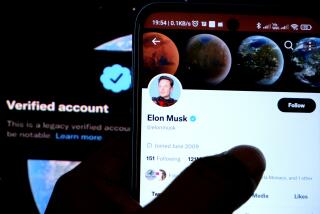Facebook adds safeguards on purchase data
Bowing to pressure from a mass online protest, Facebook Inc., the fast-growing and popular social networking website, reversed course Thursday on a controversial new advertising program and said it would no longer alert usersâ friends about what they do and buy on the Web without their explicit permission.
Beacon, an online tracking tool introduced last month, keeps tabs on the goods and services that Facebookâs 55 million users buy or rent on partner sites such as Fandango.com and Blockbuster.com, then broadcasts those activities to friends on a news feed.
Marketers were drawn to the program because it enabled them to get their products and services in front of Facebookâs users and to run ads next to messages about purchases by other users, who might be seen as virtual endorsers for their brands.
But in less than two weeks, more than 50,000 Facebook members signed a petition objecting to Beacon. Some complained that their Christmas surprise was ruined when they saw what gifts their friends and family were buying for them.
Now, users must click âOKâ before those alerts are sent to friends, Facebook said in a statement. Users also have the option to have specific purchases removed from their news feeds.
âNo stories will be published without users proactively consenting,â the statement said.
The protest was led by MoveOn.org, a political advocacy group whose consumer arm seeks to protect consumersâ privacy, among other things. Its spokesman, Adam Green, said Facebook seemed to have answered one of two major concerns that MoveOn.org raised.
âIf Facebook implements a policy whereby no private purchases made on other websites are displayed publicly on Facebook without a userâs explicit permission, that would be a big step in the right direction and would say a lot about the ability of Internet users to band together to make a difference,â Green said.
MoveOn.org is also pushing for Facebook to offer a one-click opt-out option to remove themselves from Beacon altogether. âWe will have to see how itâs implemented before we comment further,â Green said.
When users first complained, Facebook argued that it offered two ways for users to keep information from reaching their friends and that users would soon become accustomed to it. When the protest continued, the site tried to appease users with tweaks such as making opt-out boxes larger and having them remain on the screen longer.
The dilemma confronting Facebook is common to Internet companies that rely on advertising for revenue: how to generate revenue from users without alienating them.
The Beacon feature surprised even an analyst who tracked the company. Forrester Researchâs Charlene Li bought a table on Overstock.com and was so surprised to find the purchase in her news feed that she blogged about her distaste of how Facebook was using Beacon.
MoveOn.org launched the petition protesting Beacon on Nov. 20. Other smaller groups have also formed on Facebook to protest Beacon. Two privacy rights groups are preparing to file complaints with the Federal Trade Commission.
Facebook users volunteer an extraordinary amount of information including their age, educational background, political orientation and sexual preference. They also post photos and messages to their friends.
The site experienced a similar backlash last year when it introduced the news feed feature. More than 700,000 people protested.
--






